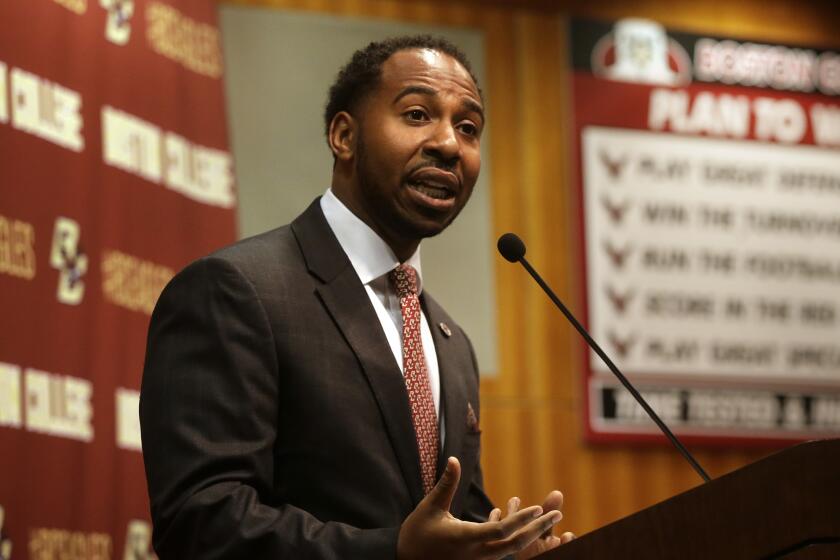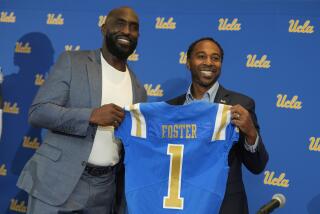UCLA’s Martin Jarmond is no stranger to society’s pervasive racial problems
- Share via
As he told the story recently, a tinge of discomfort evident in his normally upbeat voice, Martin Jarmond could feel the sensations returning from all those years ago.
The gun pressed against his temple. The rain falling on him as he waited outside the car. The embarrassment as classmates drove past on their way home from the high school football game in Fayetteville, N.C.
Jarmond was 16 years old and an unlikely police suspect. He was student body president, had not been drinking or partying and was about as straitlaced as any high school kid could be.
None of that mattered to the white policeman who pulled him over on his way home from that game and, gun drawn, yelled at him to get out of his mother’s Honda Accord.
Martin Jarmond has long thrived in the role as the underdog. Having just turned 40, he prepares for his biggest test yet as UCLA’s new athletic director.
“Not, ‘Do you know how fast you were driving, do you know why I’m pulling you over?’ ” Jarmond, UCLA’s new athletic director, said, recalling what would have been a more expected exchange. “He just said, ‘Get out of the car!’ ”
Startled, Jarmond rolled the window down and felt the officer’s gun pressed to his head. The officer repeated his command to get out of the car, forcing Jarmond onto the trunk of the vehicle.
Finally, after a wait of about 20 minutes that felt more like two hours, the officer informed Jarmond of his alleged crime: driving 40 mph in a 35-mph zone, which Jarmond said wasn’t the case.
Jarmond shared that story to illustrate the terrorizing of African Americans by law enforcement that continues to spark outrage as part of the Black Lives Matter movement in the wake of George Floyd’s death in Minneapolis.
But Jarmond isn’t just talking about it. His first official act upon becoming the Bruins’ athletic director was to create a Voting Matters Initiative focused on education and registration that will help the school’s athletes use their voices to enact change.
“Before you can vote, you’ve got to be educated about voting and registering and preparing to make a change and make an impact,” Jarmond said of an initiative that will require coaches to facilitate voter education sessions for each of the school’s 25 teams.
Jarmond downplayed becoming the first African American athletic director in UCLA’s history upon his hiring last month, saying he preferred to focus on his qualifications, but he hasn’t retreated from difficult conversations involving race. In fact, he has encouraged them, saying they’re required to raise awareness among white people about deeply rooted social injustice.
New athletic director Martin Jarmond says working at UCLA will give him a chance to make an impact at an elite athletic and academic university.
“It’s systemic and the only way you bring change to a systemic issue is by people that are not oppressed or people that don’t have the same level of treatment — that’s what causes change,” Jarmond said. “So we have to amplify our voices, we have to listen, we have to learn and I shared that [personal ordeal] because that’s my own way of trying to make change, is doing something uncomfortable.”
Jarmond never lodged a complaint or even told his parents about the police incident, saying he almost felt like he had done something wrong because African American men tended to normalize getting pulled over. He now realizes that his only offense may have been harboring a disdain for police officers.
“You know, you can’t color a broad stroke with a group of people by one experience, but you’re young — you’re 16 or however old you are — and that’s what you do until I had enough life experiences with other law enforcement to where I understand that was one person,” Jarmond said. “But when you look at the broader scope, it happens too often for it not to be systemic.”
More to Read
Go beyond the scoreboard
Get the latest on L.A.'s teams in the daily Sports Report newsletter.
You may occasionally receive promotional content from the Los Angeles Times.








